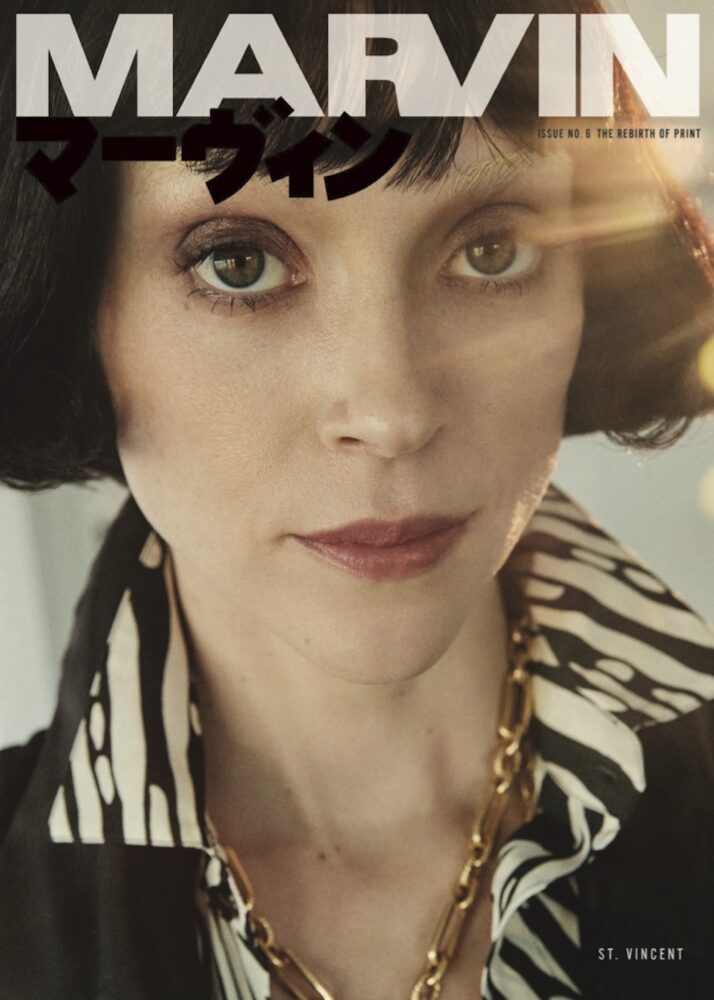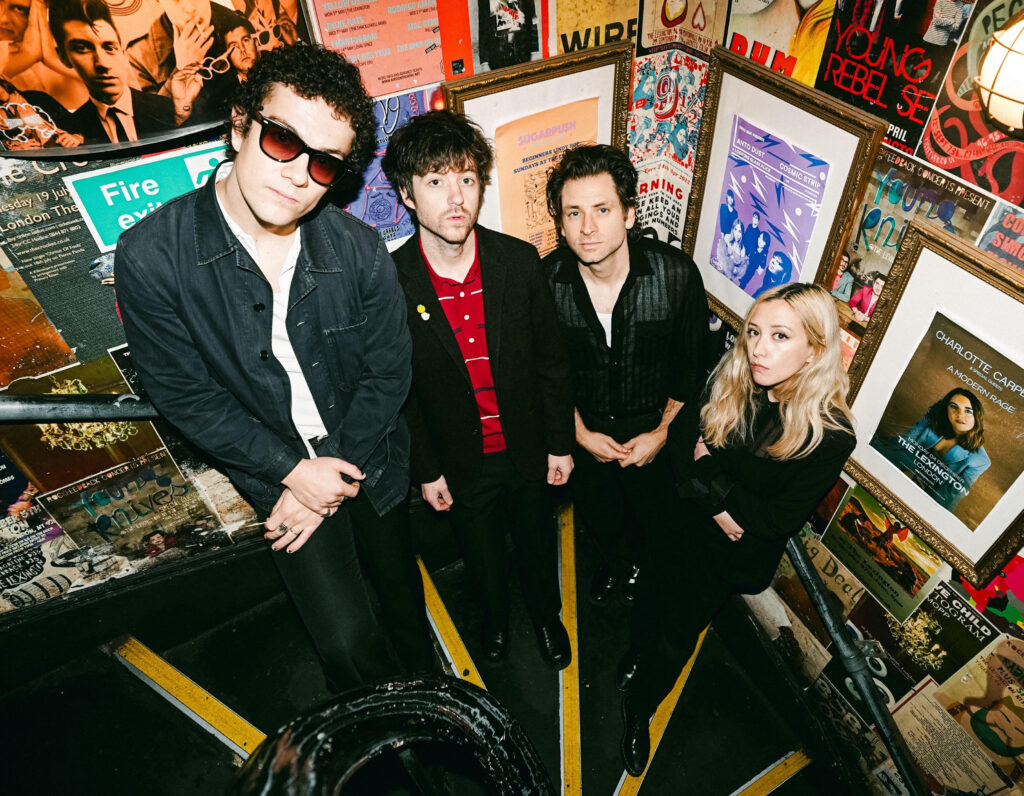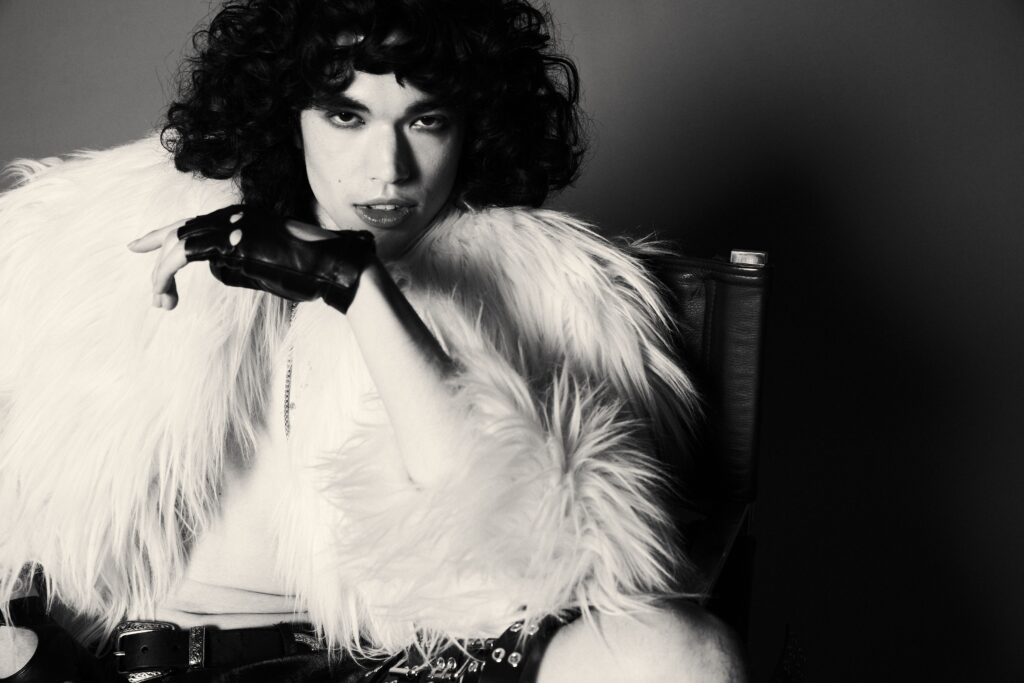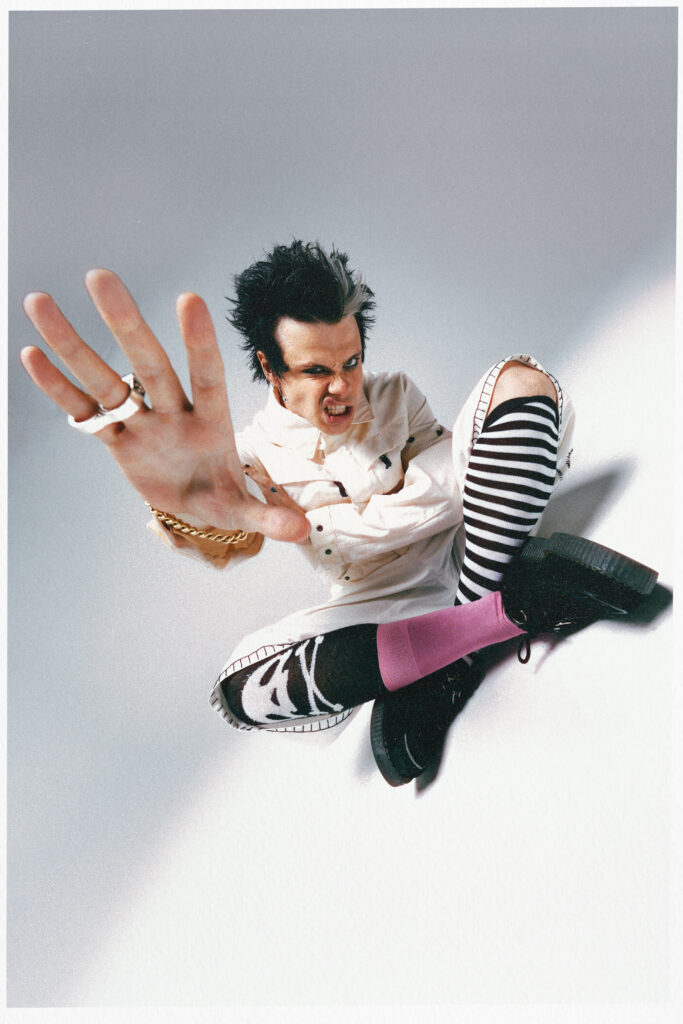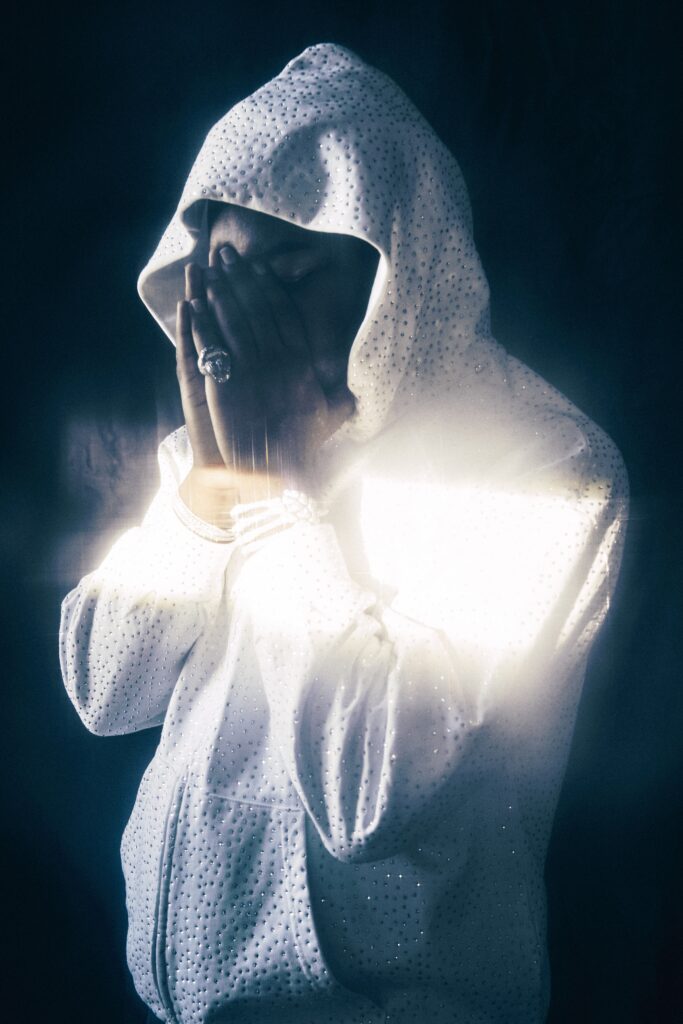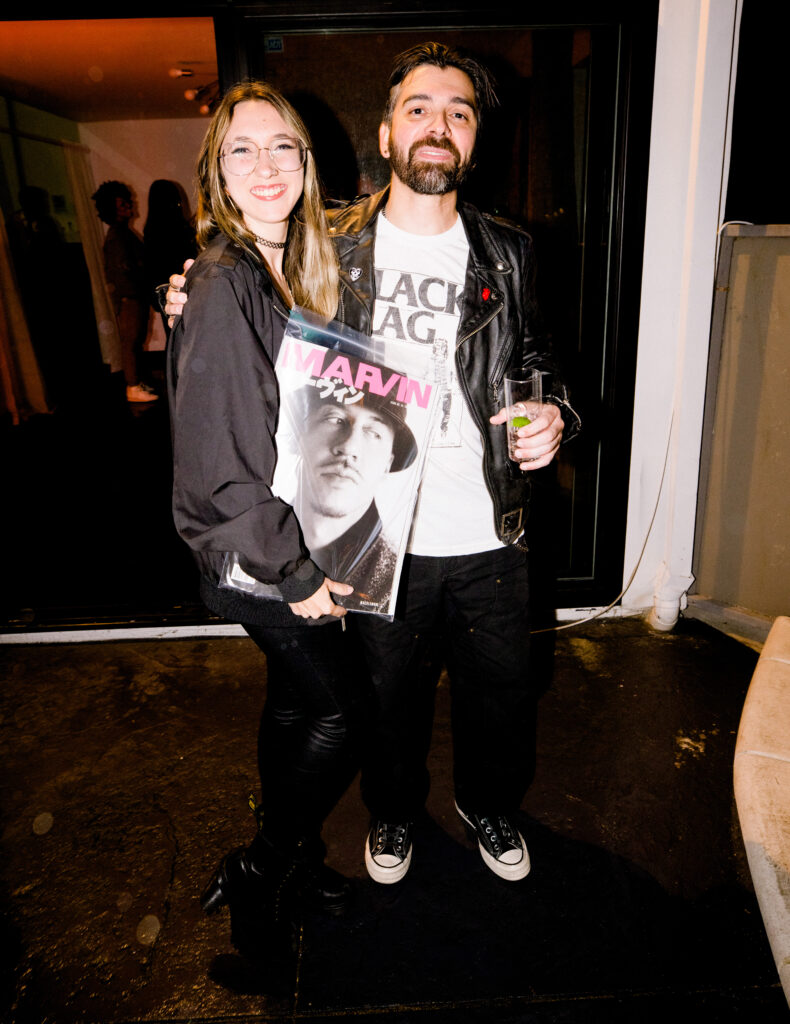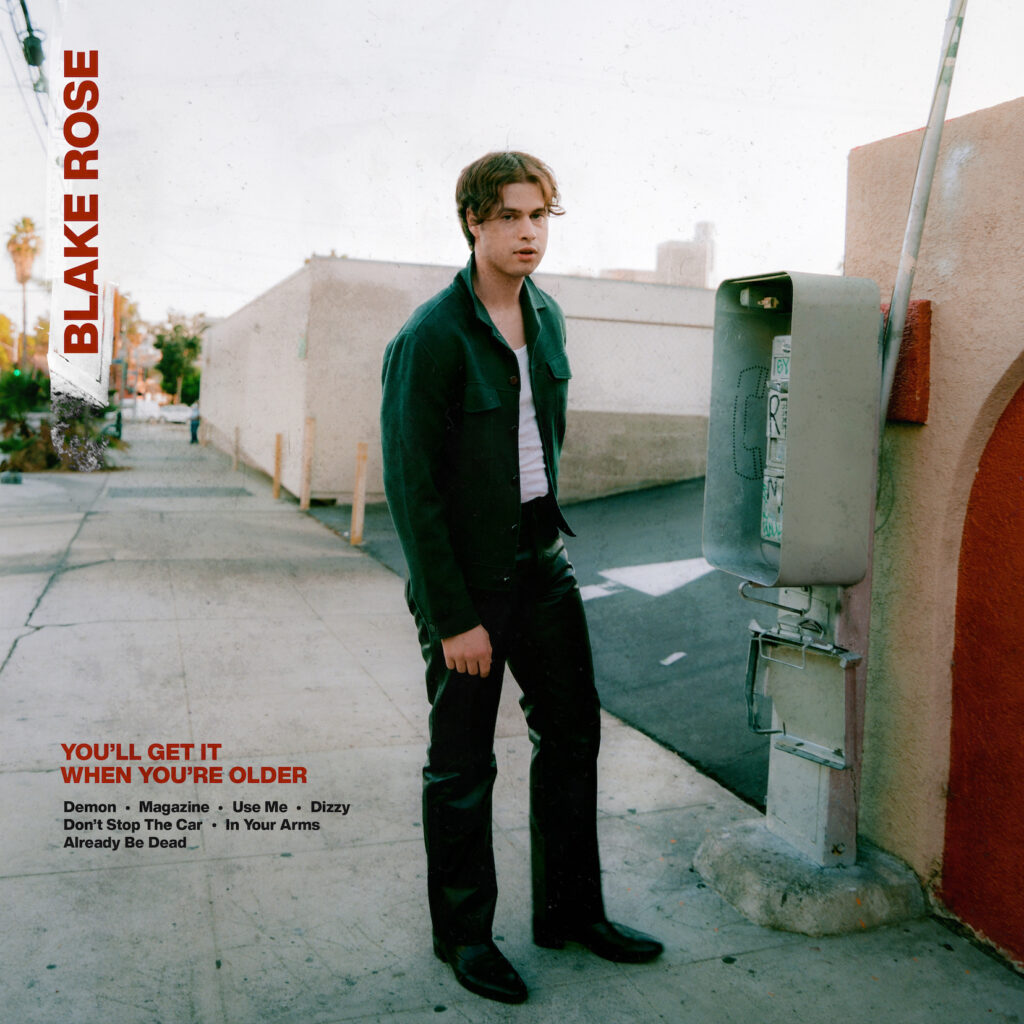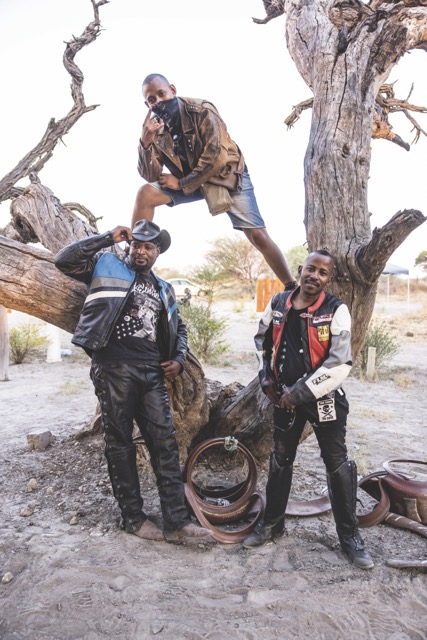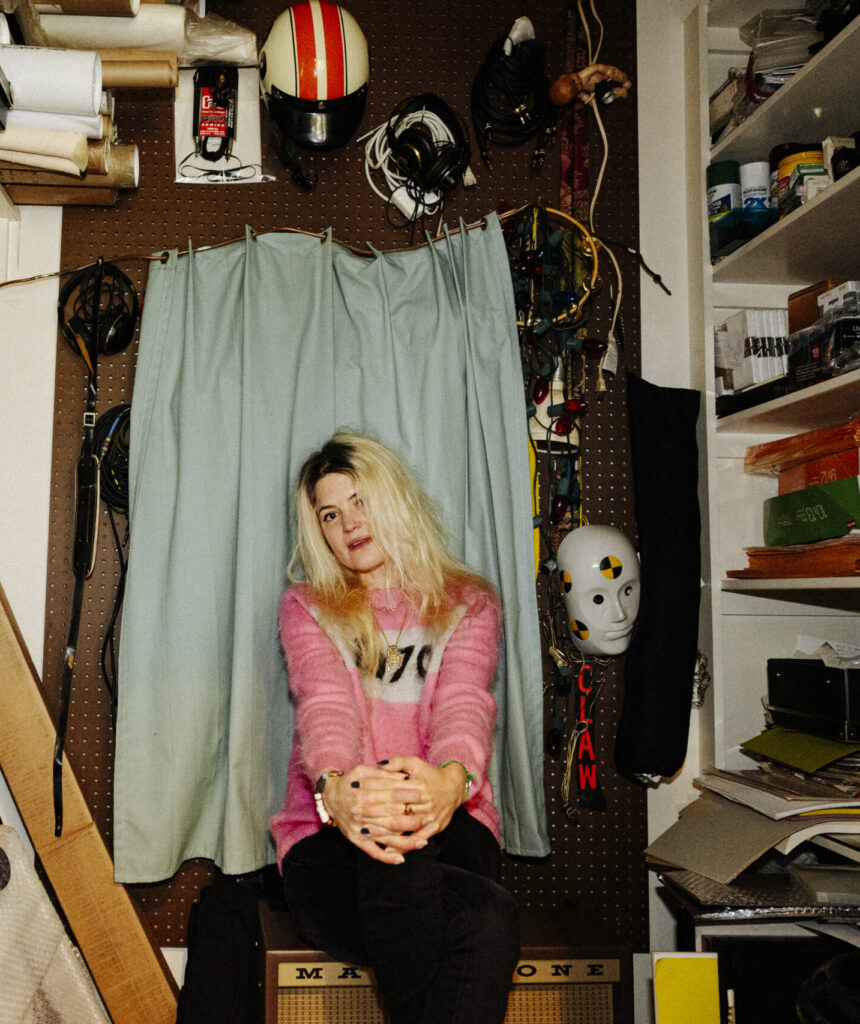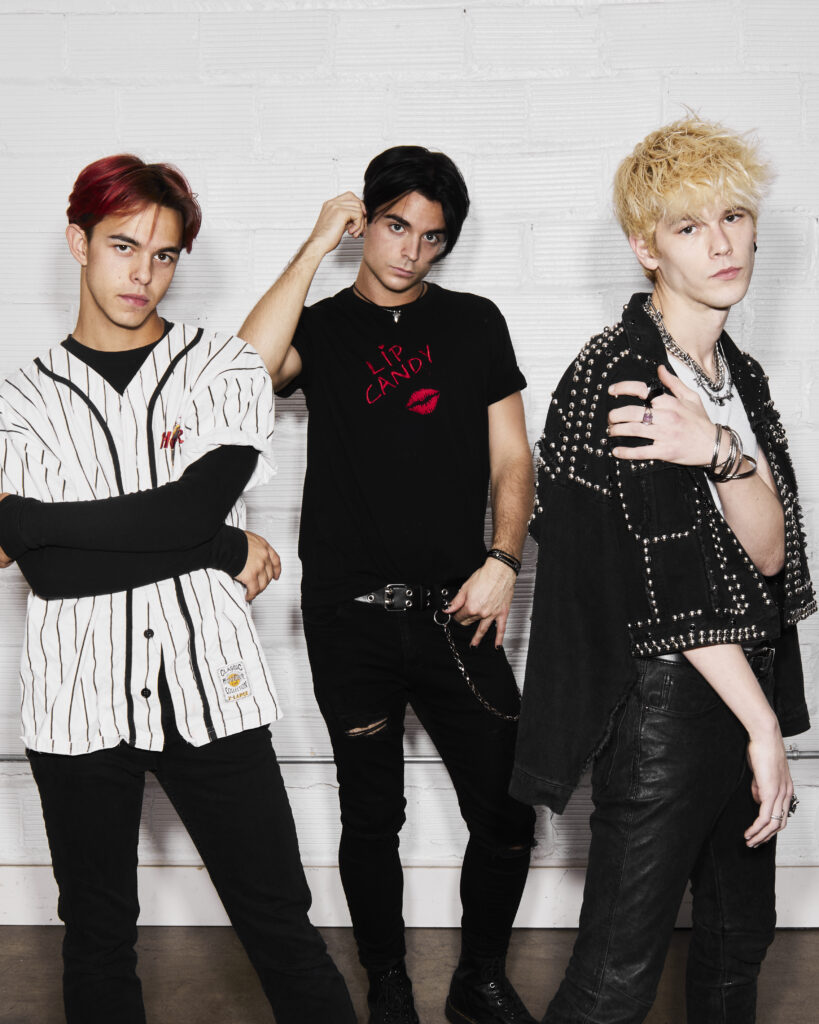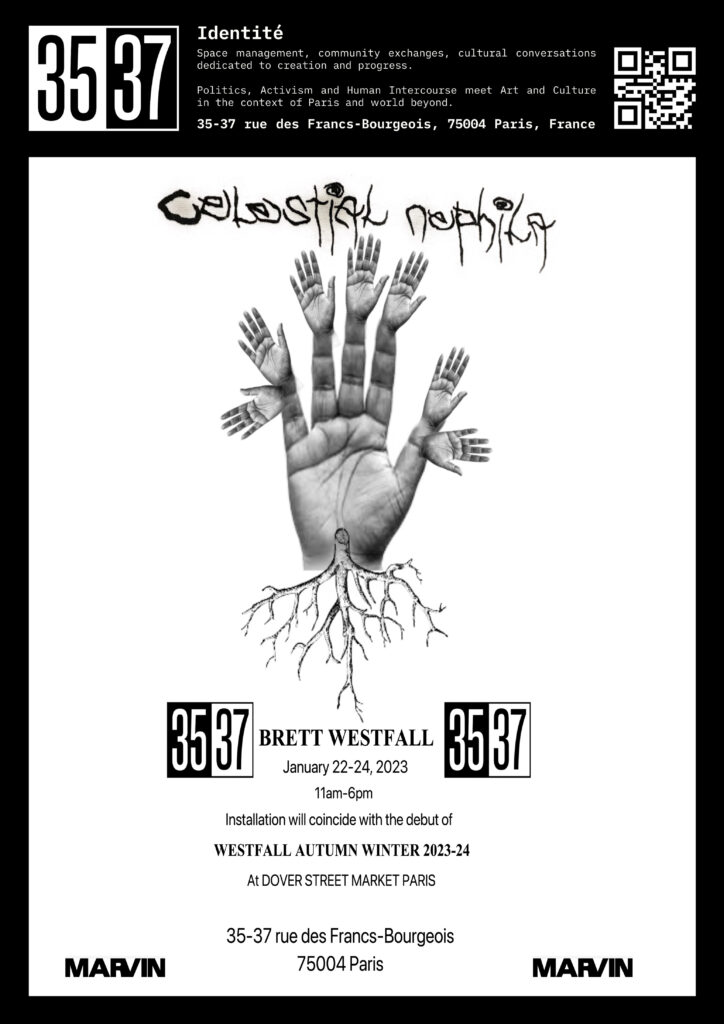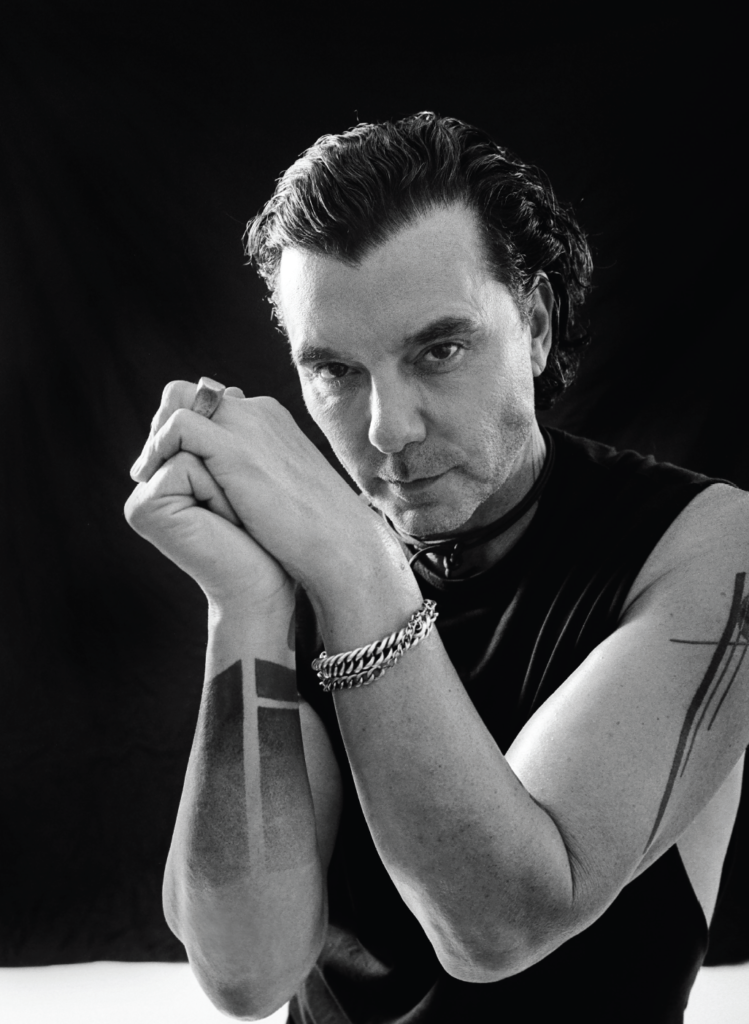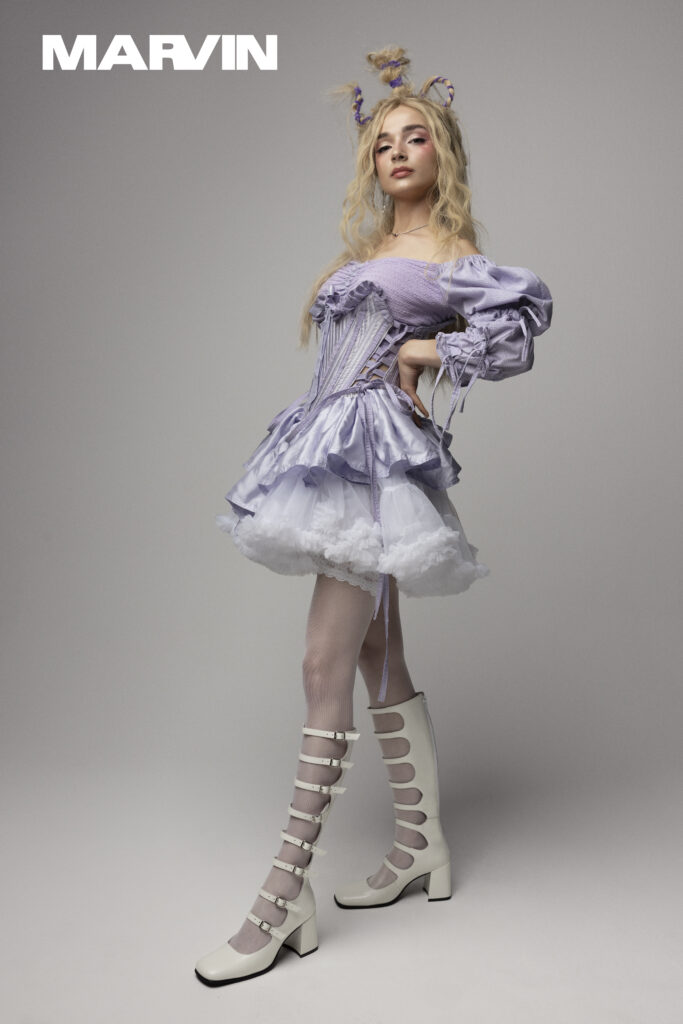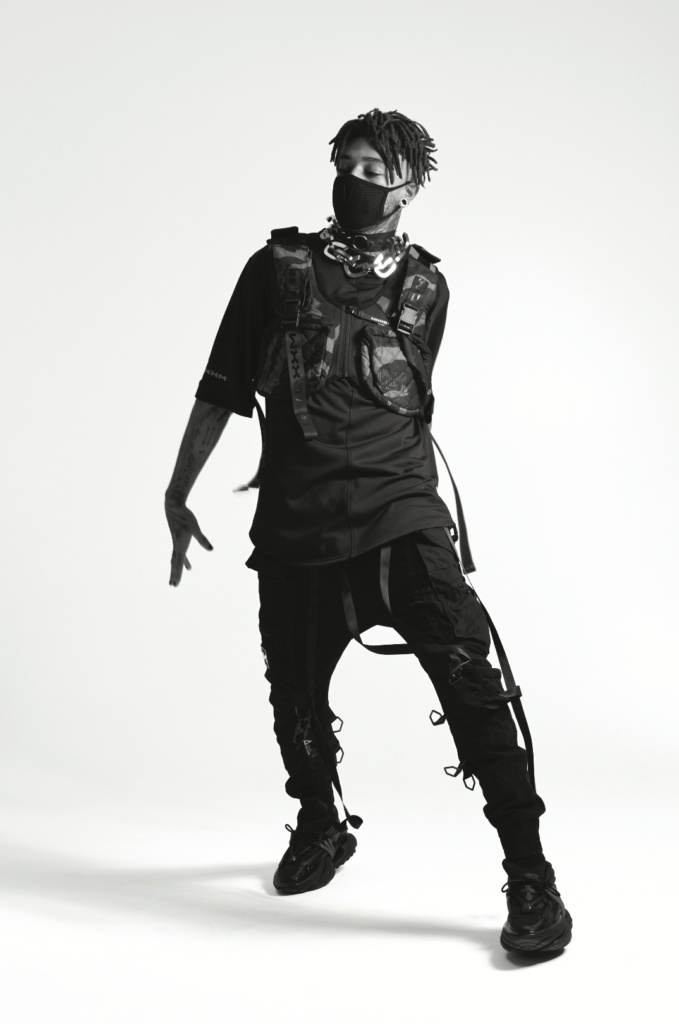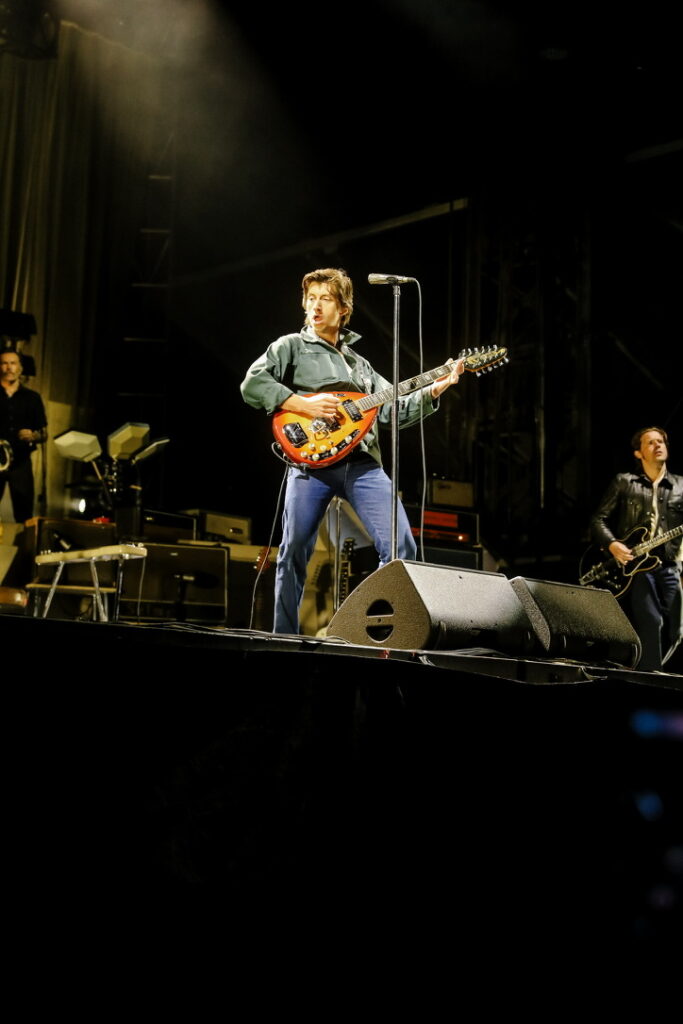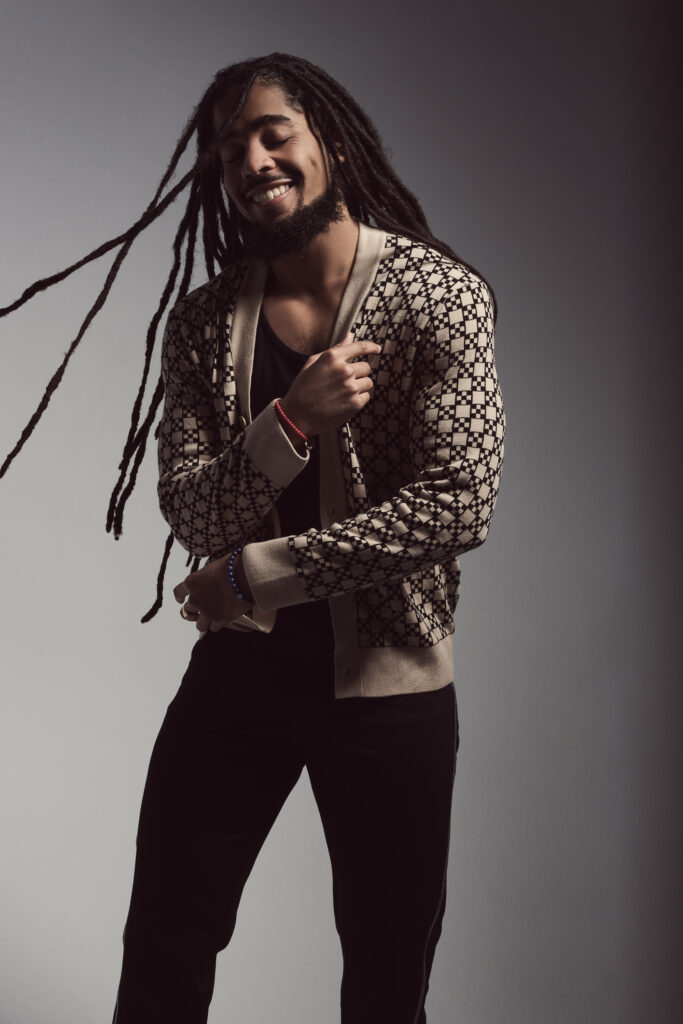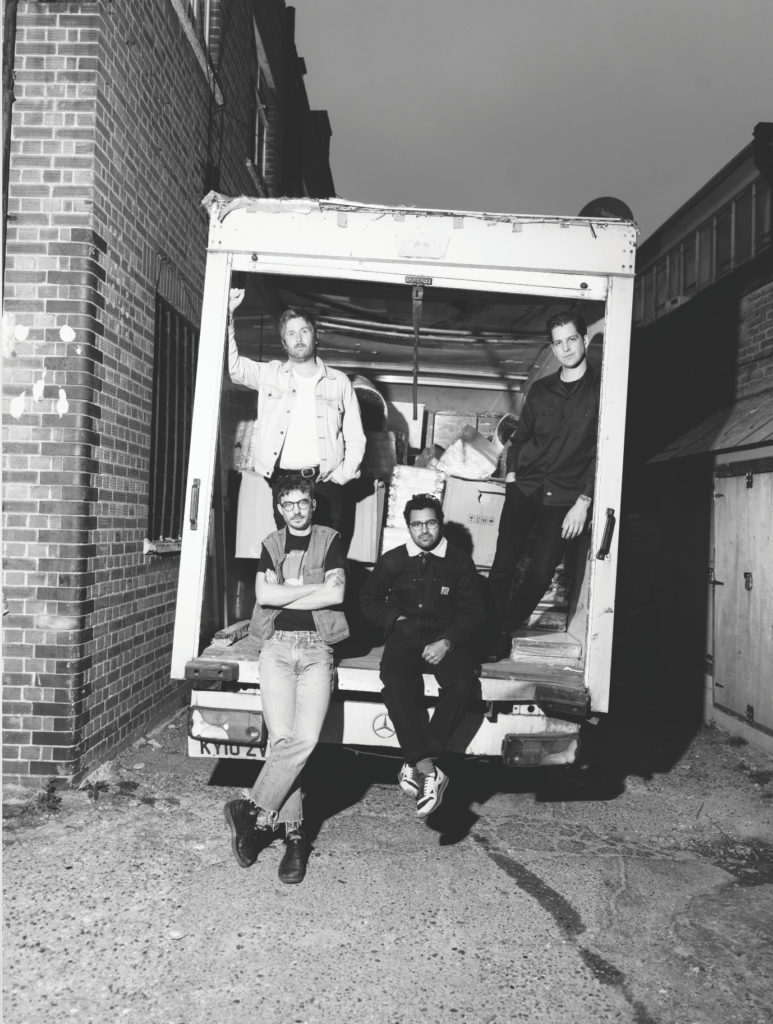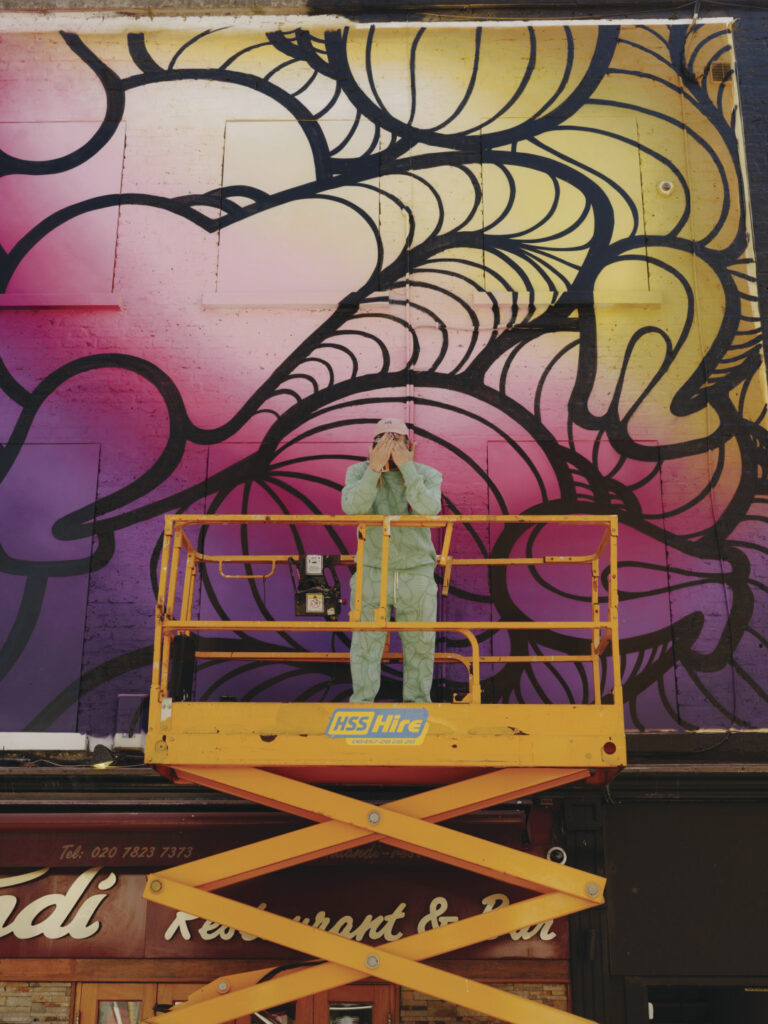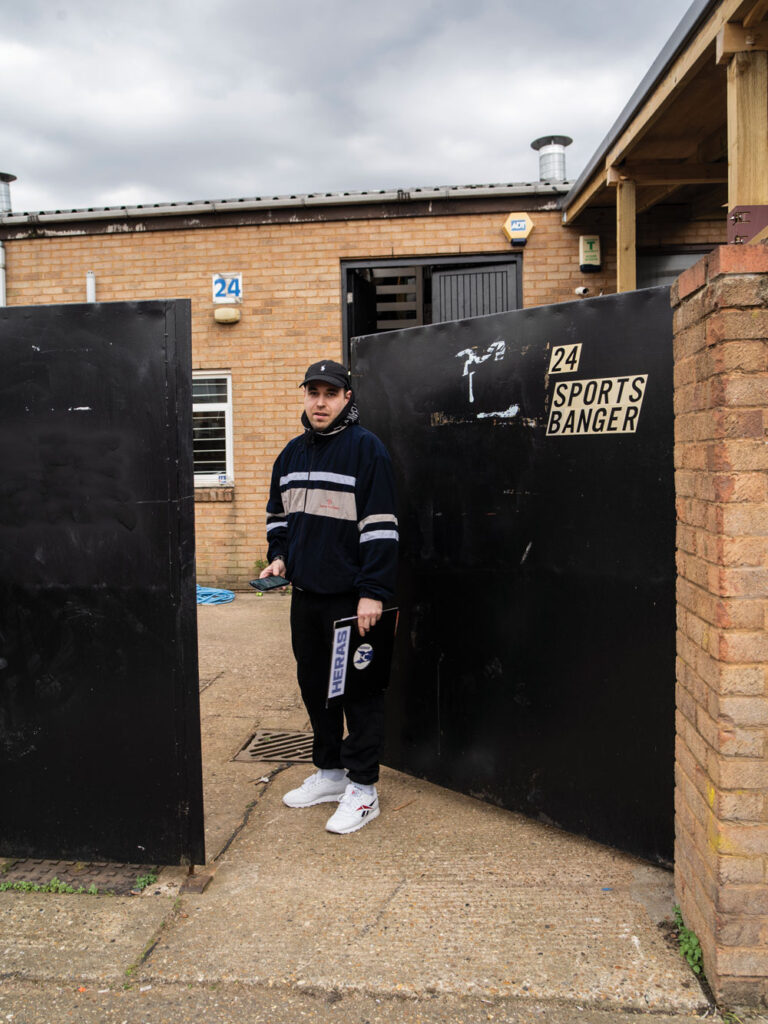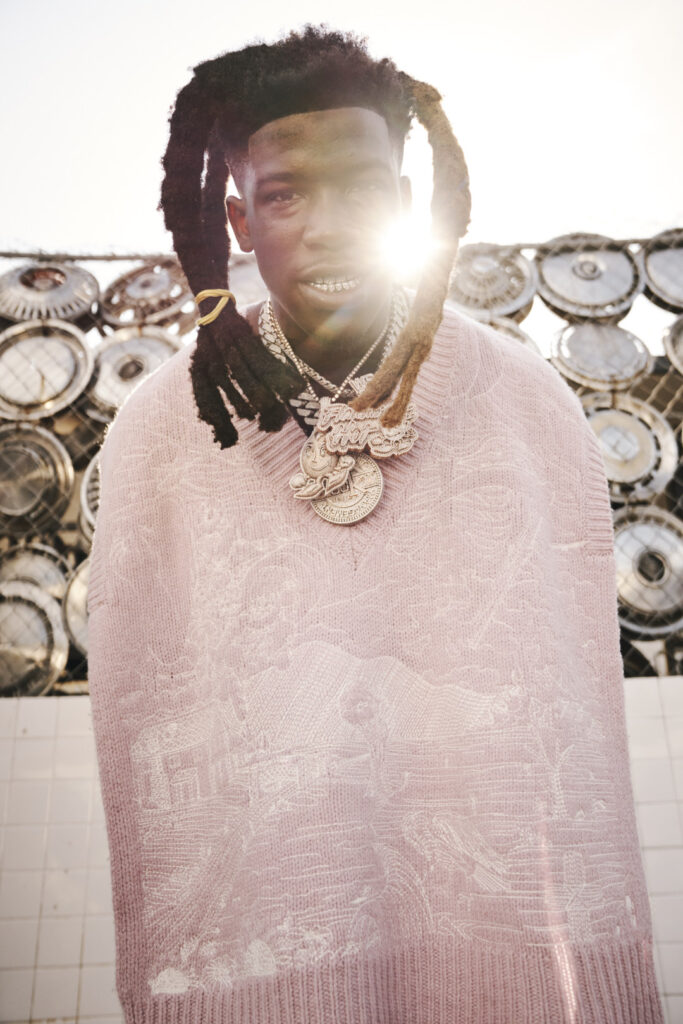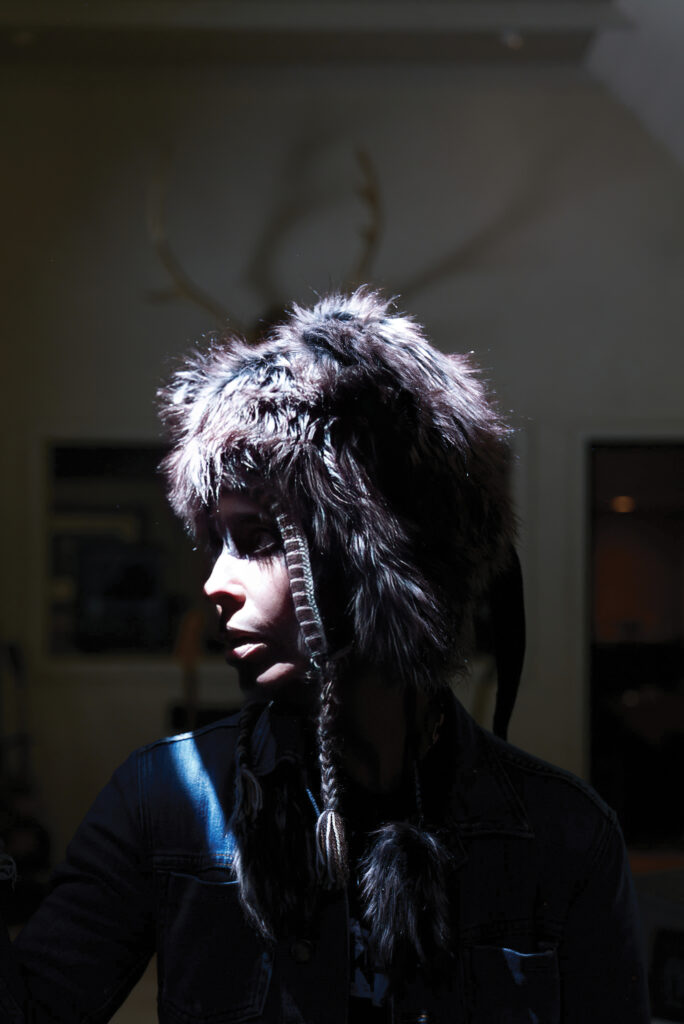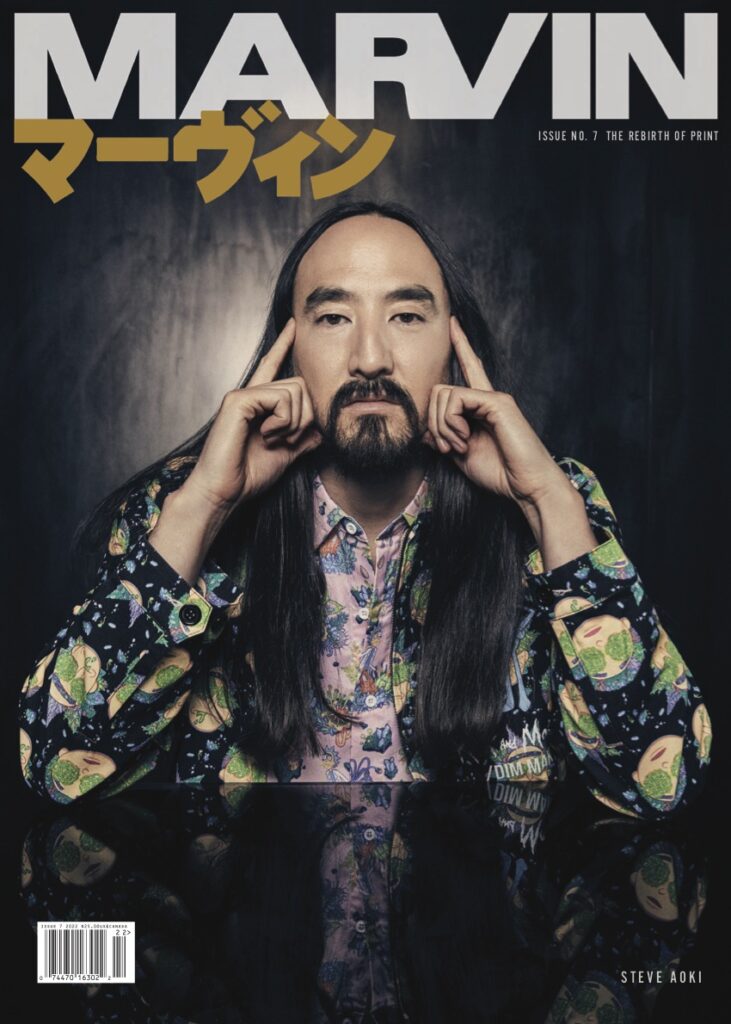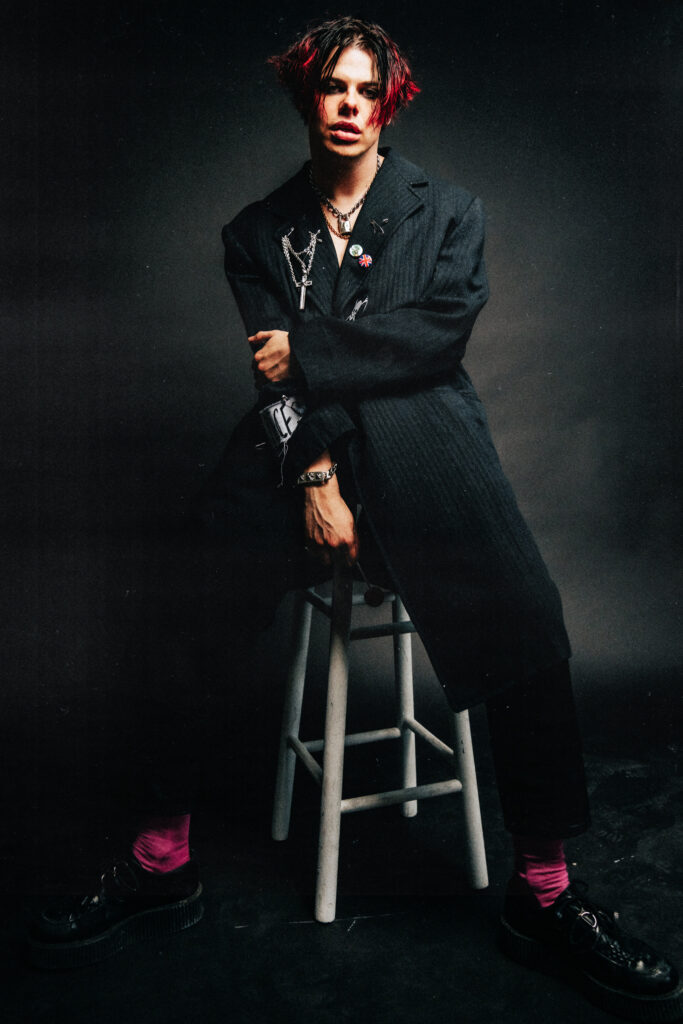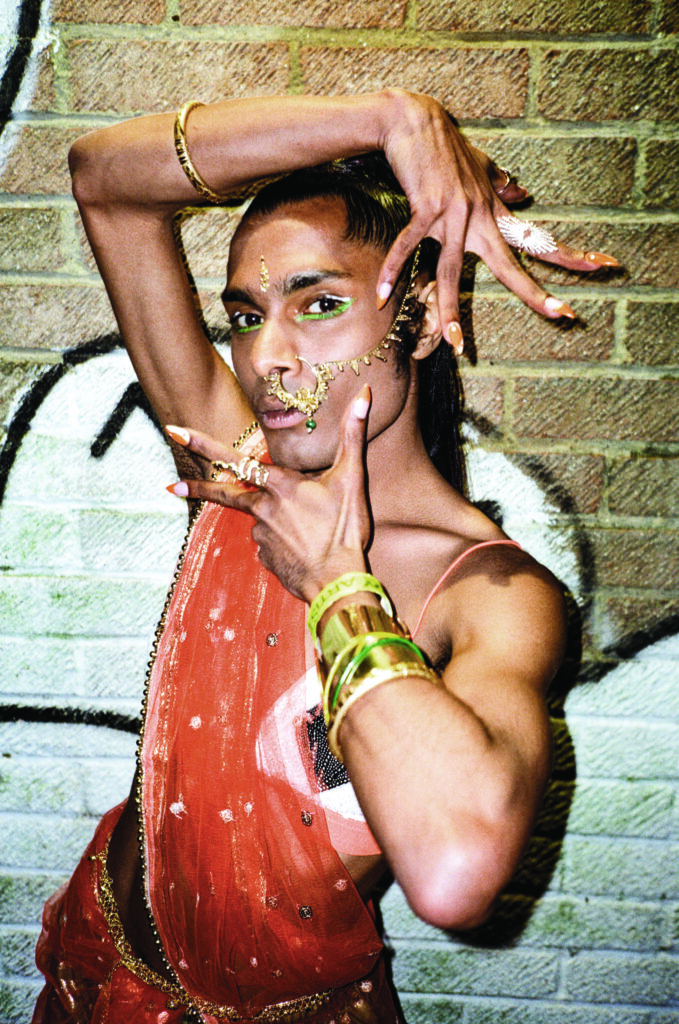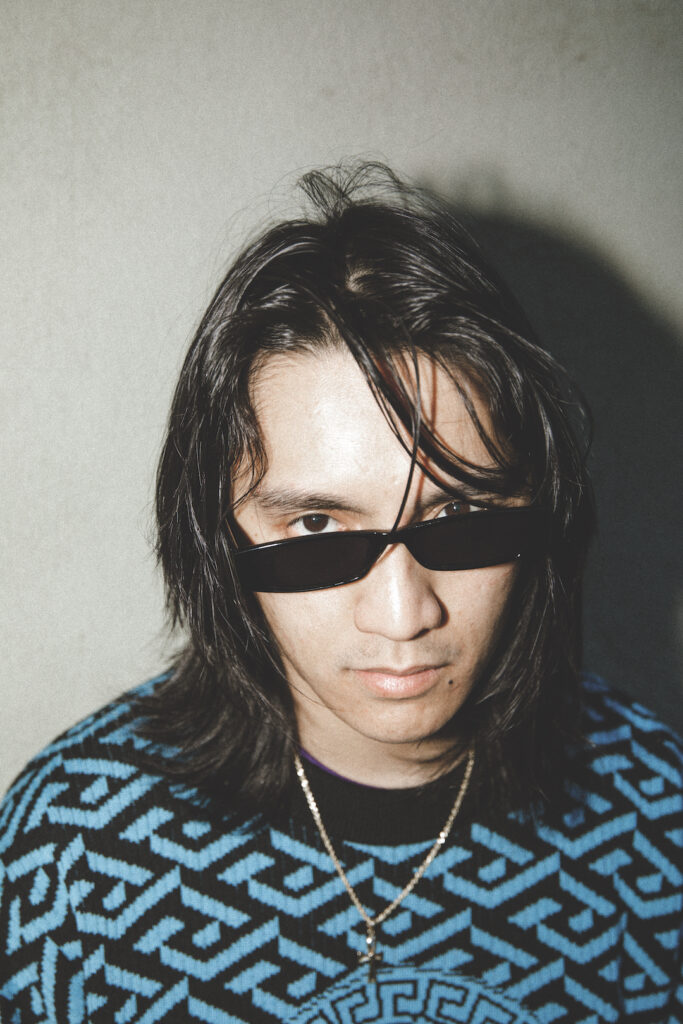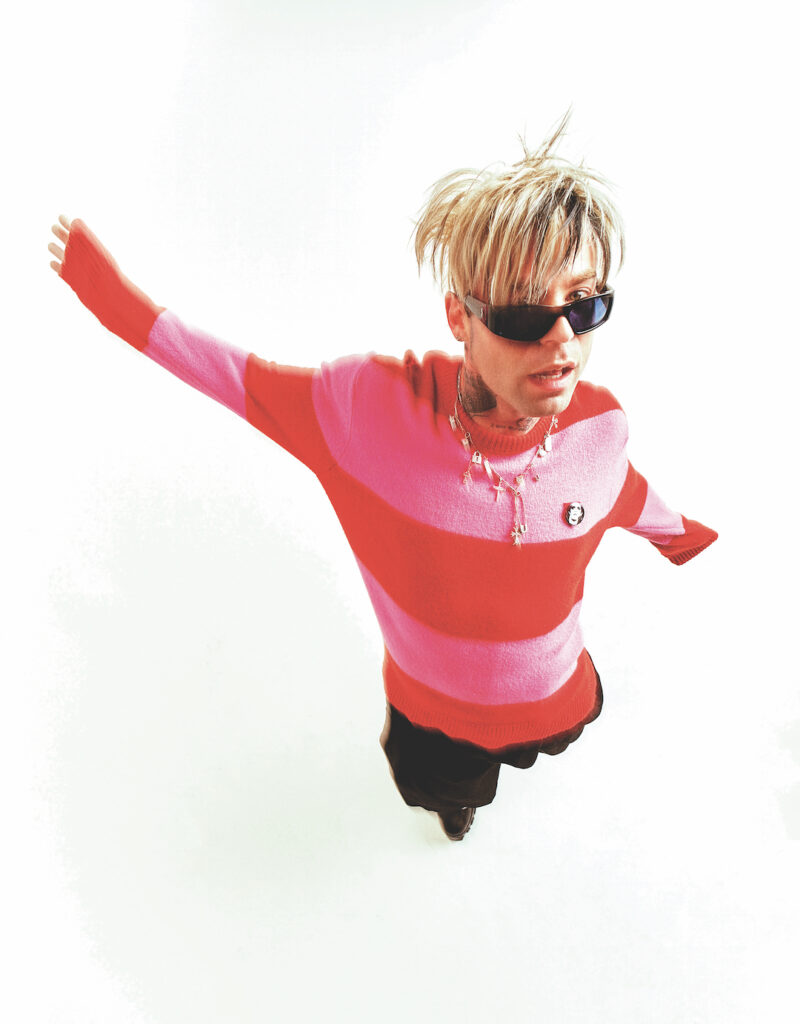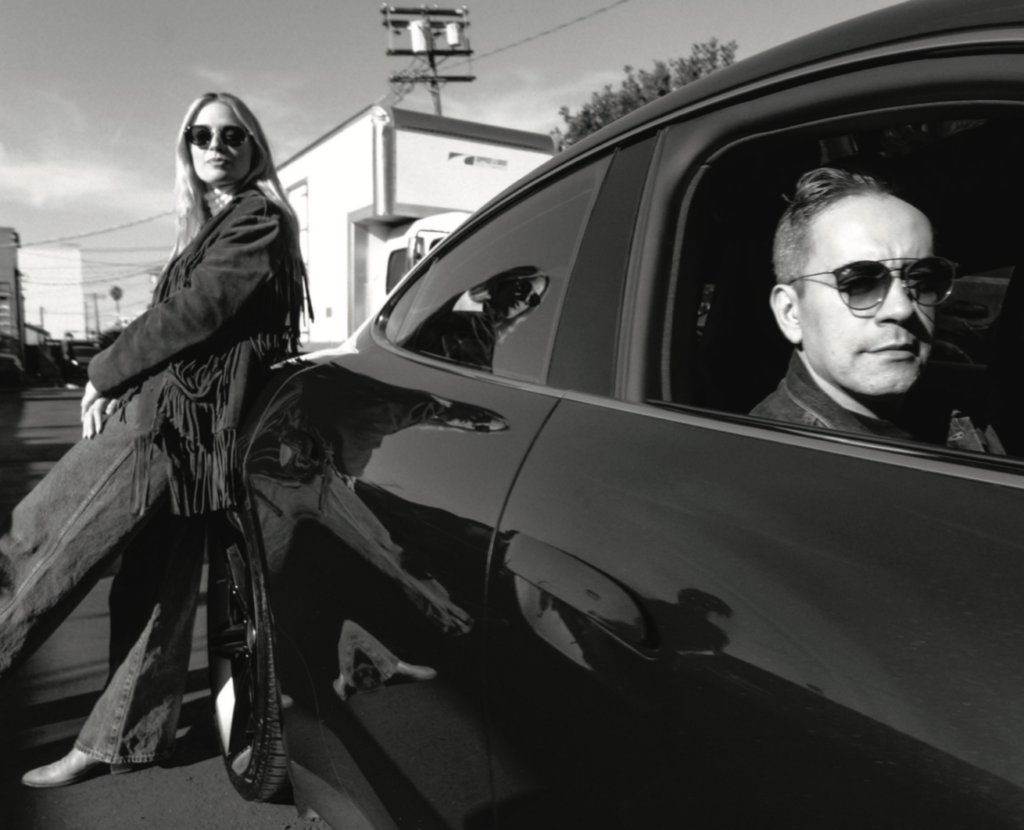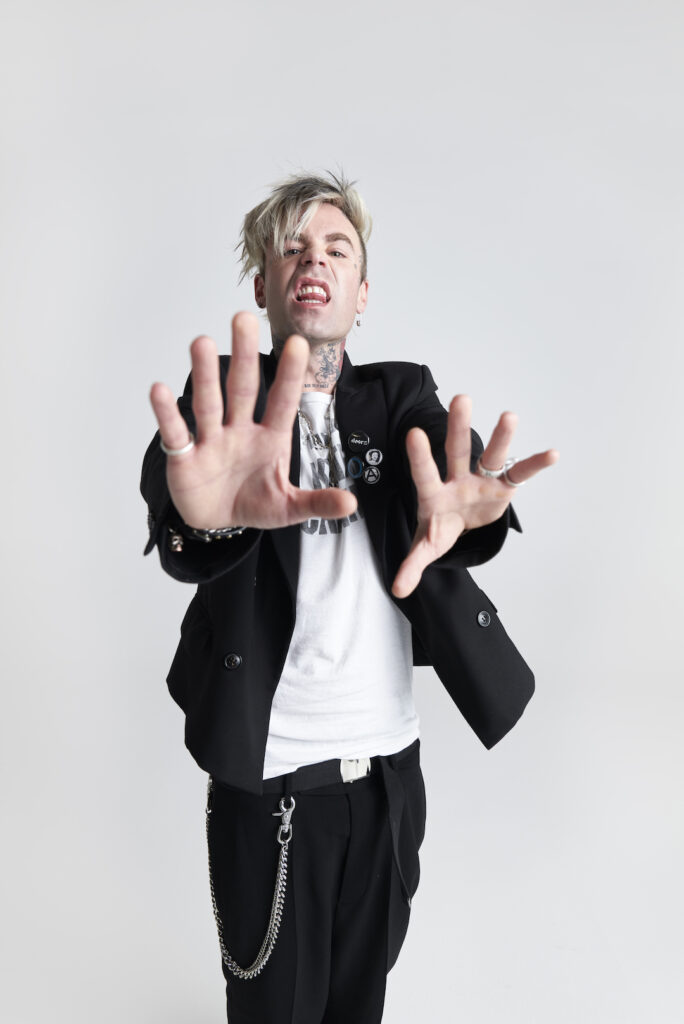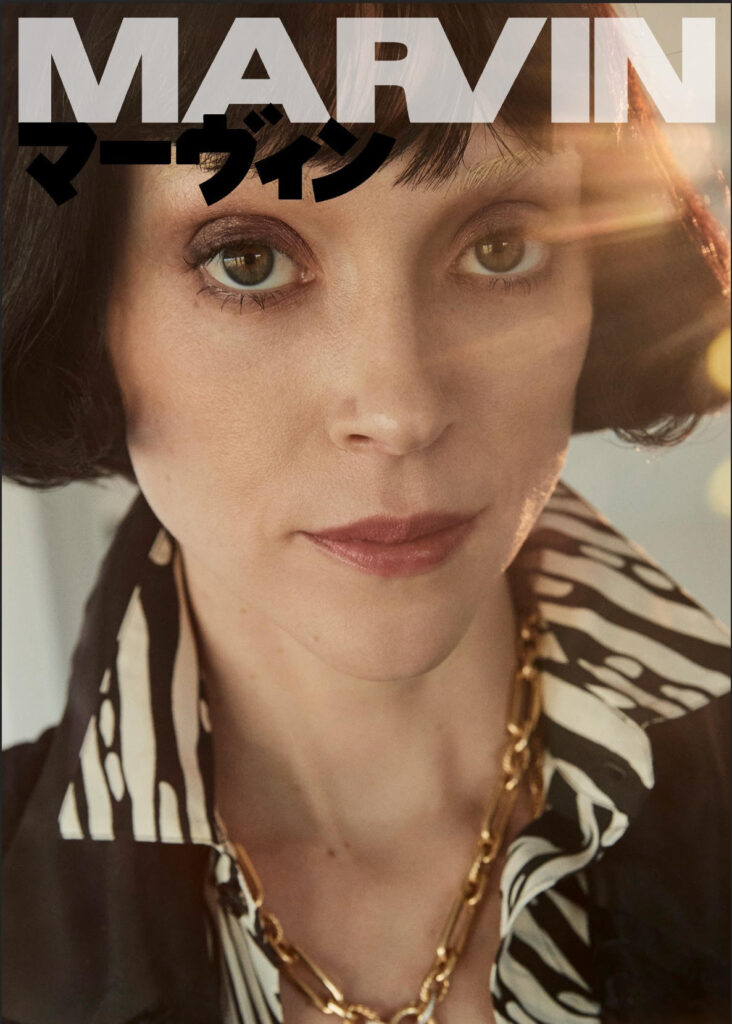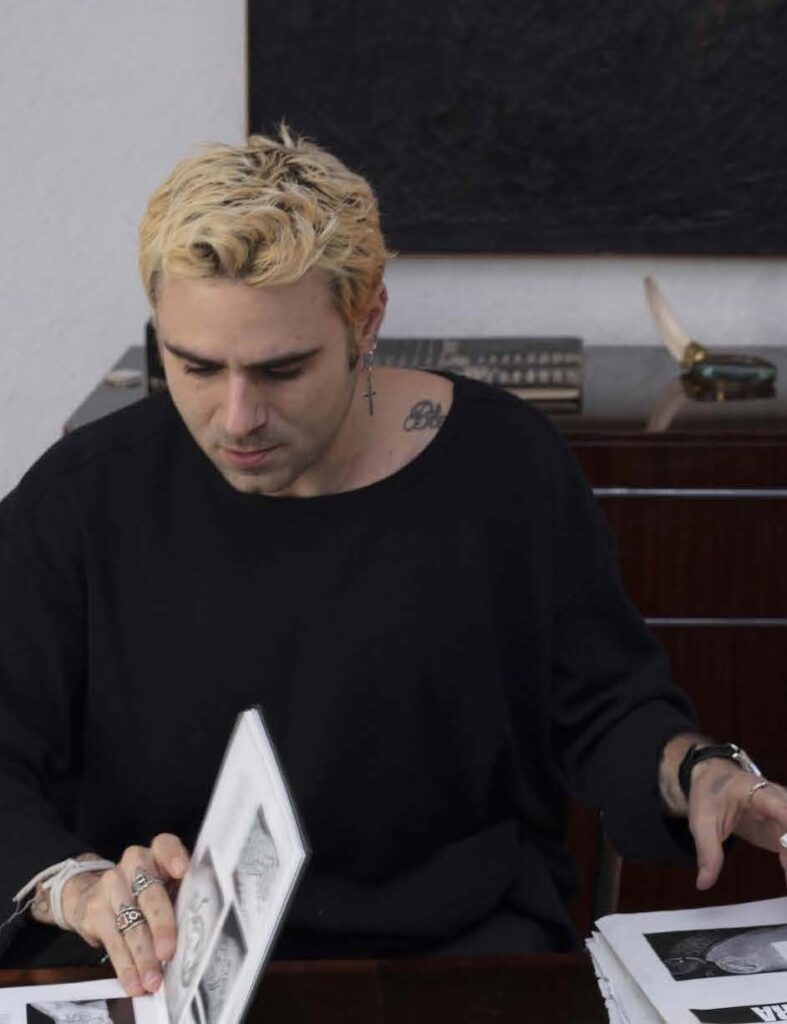Two-time Grammy Winner and MARVIN Issue 5 Cover Star St. Vincent Gets Personal About the Past, Present and Her Latest Album Daddy’s Home
WORDS by DAVID LEVESLEY
PHOTOGRAPHY by KENNETH CAPPELLO
STYLING by AVIGAIL COLLINS
HAIR by PAMELA NEALE
MAKEUP by HINAKO
St. Vincent doesn’t dwell on the past.
The odd motorbike chase or gig but often trying to remember a period seems like an archaeological dig; parsing for a ruin lost under the multiple cities built in its wake. There are reasons for this. Annie Clark admits she hyper-fixates on each project, sheds it and moves on immediately. She has a sense of ironic detachment learned from a father who had “a kind of humor that you don’t really understand as a kid.” This ripples through much of her music. Both perfectly acerbic in its observations of people and painfully erudite about modern life. It’s a blend that always reminds me of that meme: If I don’t turn it into a joke, it will destroy me.
When I spoke to Clark over the phone, she was sitting in her LA studio, a room full of guitars and gear. As we start talking about her 15 years as a recording artist, I couldn’t help but go in worried. Interviewing St. Vincent has often mythologized to be a momentous feat, a metatheatrical ballet between reporter and subject as she throws up dust clouds to obfuscate the truth. But when we spoke, she is kind, generous, caustically funny and sharp as a tack, gently ribbing me for the breadth of references to her previous records. Speaking about her body of work, it felt clear that for any period of opacity, there were also periods of vulnerability, frozen in resin and turned into some of the best albums of this millennium. Thank god for Annie Clark: a woman who truly knows what to do when she needs to suck the venom out.
On a recent trip home, Annie’s mother (“a very sincere feminist”) dug out all of her daughter’s artwork from when she was a child. Much to Clark’s surprise, and long before she started playing one herself, “everything was a guitar.” She had no recollection of any of this but from the age of five, “I was obsessed with guitars. I remember loving music and I was obsessed with the shape. So there must have been something magical there in the portal of the guitar.” At twelve, inspired by her dad playing Jimi Hendrix and other 60s and 70s musicians–“one of the last great moments for American rock guitar”–she picked up a classical version herself. She quickly realized, “I needed to trade it in for something that could really go loud.”
One could argue the guitar still has the same ineffable hold over Clark especially if you see her play live. To watch her play guitar is to see a performer truly in a flow state, as much the conduit for the guitar as the guitar is the conduit for her. I mentioned that I had seen her play in Central Park back in 2010, circa her sophomore album. “Oh god” she groans, horrified she might have been seen publicly playing music 12 years ago. Watching her play at the time had had an oddly stressful quality almost as if she was trying to wrestle a beast back under her control. Her name may be a reference to the hospital in New York where Dylan Thomas died but watching Clark in action can feel like witnessing someone summoned to a divine and complicated calling.
Like many queer artists before her, Clark had to initially shed Texas–and home–to find her whole self. “There’s a culture where I grew up, at that time, of homophobia, sexism… of people wanting to beat you over the head with their idea of morality,” she explains.
“If I stayed, a part of myself would die.” Now, she insists, she loves Texas and lives there part of the time, “but you’re returning from a place of strength, more fully yourself than if you’d still been under that roof.”
Is Clark’s queerness something that manifested, or even had a name, when she was growing up? Usually erudite and swift to answer, it’s here that Clark pauses longest. “I actually haven’t thought about that in a long time,” she says, a bit surprised at herself. “I certainly identify as queer…” she pauses again and focuses more on the present than her past when she resumes. “There’s finally a lexicon for gender which there wasn’t when I was growing up. It’s very empowering to see people come into their own and get a language for things that they felt. I hope that once all identities are accounted for, that there’s just a more exciting human experience.”
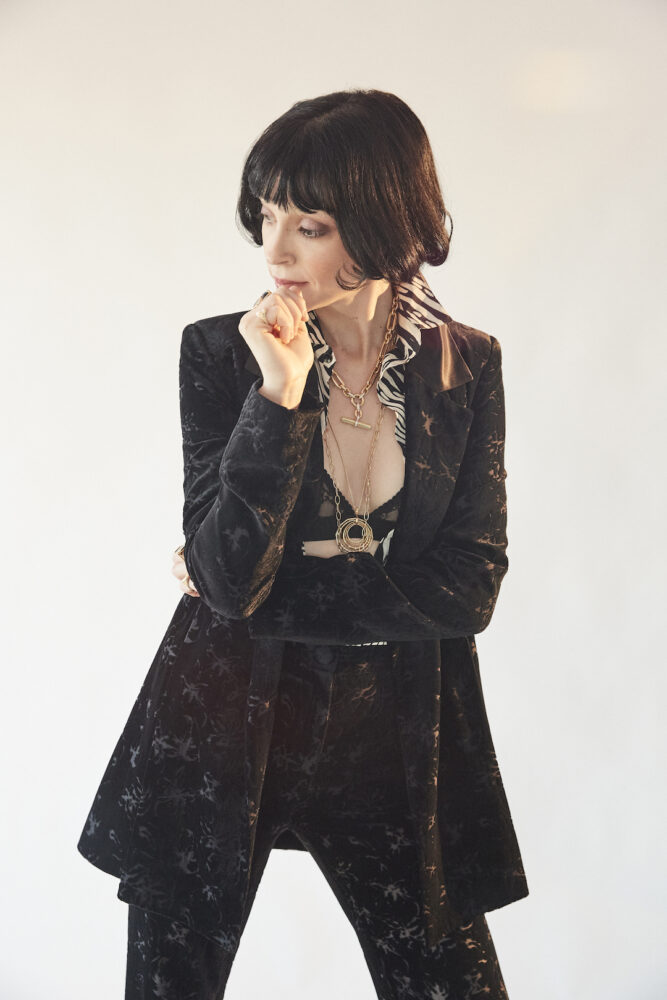
In the years between picking up the guitar and releasing her first album, Marry Me, in 2007, St. Vincent had an eclectic but incredibly informative time working with two of that era’s most unusual and spiritual rock acts. Her first tour “that wasn’t in a minivan” was with The Polyphonic Spree, a choral rock band that she describes as a “spiritual acid freak show” in which she was “a carnival barker in a robe.” It was both a time of incredible expression and also eye-opening as to what performance could be: “I remember my first show with them being in front of 40,000 people and thinking… whoa, I want this.”
Next came a stint with Sufjan Stevens as a member of his live band which was likened to being “in an orchestral ensemble.” Clark would go from vocals to piano to bass and back again; and while the Polyphonic Spree was about going wild, this was “more straightspined.” At the time she had an EP and would open for Stevens as well. She’d go right from her 30-minute set to playing another two hours for him. “You think about The Beatles going to Hamburg and just learning how to do the thing. I got a lot of experience just doing the thing.” Most importantly, however, she says she got to experience the dynamic of performing live. “To get comfortable being still in front of thousands of people. It’s not the kind of thing you can get good at alone in your room on TikTok.”
The multi-instrumentality of Stevens, and many of the other artists coming off his label Asthmatic Kitty Records, feels like a spiritual uncle for the baroque and varied Marry Me. It’s an album she hasn’t thought about in a long time before I ask her about it. “It’s all over the place in a sweet way. I was a child!” she says, as if needing to excuse it. While the album does vary a lot–“it’s a lot of, ok, here’s a song with a bossa nova thing!”–the artistry is undeniable on opulent pieces like “All My Stars Aligned” or the gothic cabaret of “Paris Is Burning”.
If Clark’s later work feels almost concept-album-like in the wholeness of their visual and sonic identity, Marry Me–and to a degree her second, Actor–are a musician conjuring a new world in each song. Yet there is such beauty and care. Leitmotifs that run through the album and a kind of wry social commentary and poetry about human sadness that are just as punchy as they are in her later work. Actor, she says, is also a product of its time. “There was this scene in Brooklyn in 2009 of conservatory kids trying to make pop music and I think that was in that realm.” She’s never felt part of any particular scene but if Actor feels a bit reactive, it only inspired her to “do my own thing, whatever that was.”
Marry Me and Actor may have turned a lot of people onto the brilliance of St. Vincent but it was 2010’s Strange Mercy that marked a shift in the mythos of Clark’s alter ego. Gone was the self-labeled “asexual Pollyanna” on the front of the first records. Here was a human snarl pressed in latex.
This was partially because Clark’s life had changed around the album’s release. 2010 was the year her father was incarcerated after being found guilty on one count of conspiracy, one count of money laundering, five counts of security fraud and seven counts of wire fraud. “That record means a lot. It’s a record full of sorrow…and the sadness and the anger and the guilt” that his disappearance brought up in her life. The album hides these details almost entirely, though there are moments that touch on something: in the song “Year of the Tiger”, Clark casts herself as an ambitious chancer with a “suitcase of cash” in their car: “I had to be the best of the bourgeoisie,” she pines, “now my kingdom for a cup of coffee.” She’d mentioned songs on the album were about loss but never went into more detail. Wanting to hide the details of her father’s imprisonment from becoming too much of public record (and thereby becoming too obvious to unaware younger relatives) the album toes a line between being deeply heartfelt and creatively ornate.
The tension between Clark and St. Vincent, bet- ween creator and the work, is a constant arc. She’s often railed against the use of the word “confessional” to describe her music. Yet Strange Mercy and onwards are albums that seem to stand as totems on the timeline of Clark’s own life, and it is an album that, while opaque in its reflections on her own life, is nonetheless one of many processes in which Clark goes into solitude, divines what she needs to say and then expunges it through the medium of music.

While Strange Mercy might be an album that only shows its teeth in flashes here and there, Clark’s delineation of herself from her work, and the bargain she had expected to strike with fame, completely changed by 2012. Already well respected as an artist, Clark went from lauded indie favorite to a tabloid regular when she entered a relationship with British supermodel and actress Cara Delevingne, “who’s still one of my dearest friends.” In the spotlight she suddenly found herself living in a version of reality she’d never anticipated. “I never thought in a million years I’d be on a motorcycle getting chased by paparazzi around London.” She’d accounted for some things in her life in the service of wanting to make it as an artist. “But I never pictured action movie sequences.”
The years after Strange Mercy, particularly between 2014 and 2016, are what Clark describes as a “long lost weekend” of intense work, touring, scrutiny and burn out.
“Fifty percent of my bloodstream was white wine,” she recounts. Between Strange Mercy and her next album, she was touring everywhere without ever stopping to recover. But for all the notoriety and pressure, there was an odd positive. The more public interest in her life and her work, the more easily news permeated through the iron membrane of her father’s prison, so that they are in touch beyond just visitations.
For all the haziness and turmoil, her musical output didn’t waiver. She collaborated with David Byrne on 2012’s joint album Love This Giant, and while Talking Heads’ imprint feels rife in her music to begin with, the “scary cult leader” avatar she embodies on her eponymous 2014 album feels the most Byrne-ified of her identities. Songs like “Digital Witness”, a savvy and dry excoriation of social media, wouldn’t feel out of place added to the setlist of the Broadway musical, David Byrne’s American Utopia.
The music kept Clark on the road but by 2016 she realized she was making herself ill. She’s not sure if it was anxiety-based but she found herself with stomach issues no one could diagnose. “My body was telling me to do something drastically different in my world. I could barely eat and I couldn’t drink anything… well, I couldn’t drink alcohol,” she laughs dryly. “It was my body saying stop.”
So she entered a period of “celibacy”, a term she mulls on and reclassifies as “sobriety.” Her only vice at this time was coffee, “which was mainlined.” What came out of the phase was Masseduction, an album that casts her as some- where between the women in Robert Palmer’s “Addicted to Love” video, Kraftwerk’s only female member and a Martian dominatrix. “That record for me is so much about stricture, control, power. What power is and who has it.”
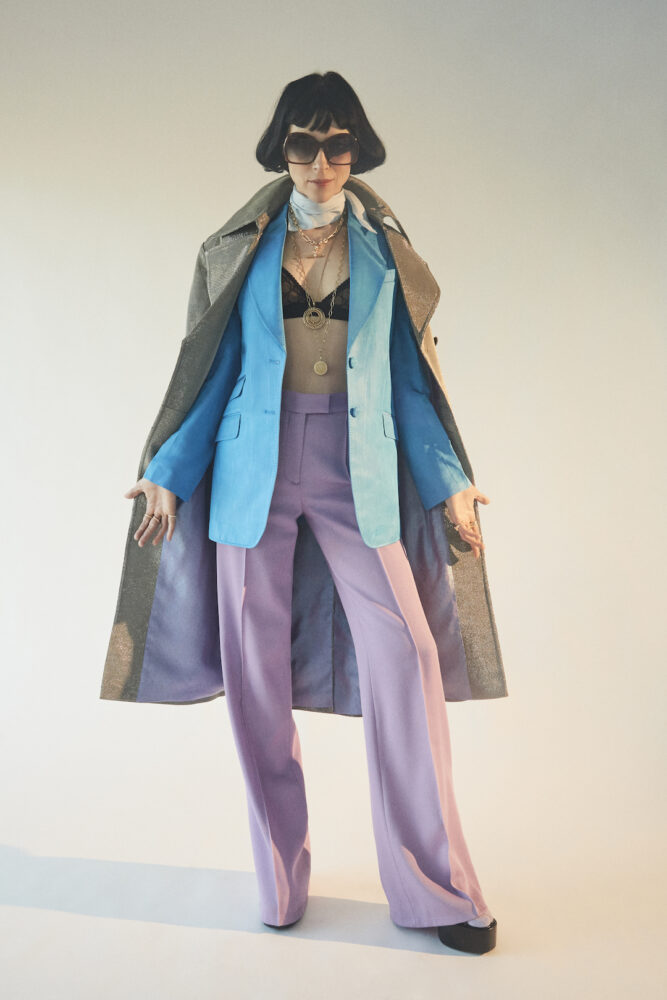
This is clear not only in the visuals for the album and the design of her tour but also sonically. “The sound of it was tight. Tight,” she says, her emphasis like a whip crack. You only have to listen to the album’s remix collection. It’s the only of Clark’s albums to have one. It also has an acoustic redux to hear how DJs have reinterpreted her dystopian fetishism or how the album’s classic “Slow Disco” has had another life as club hit “Fast Slow Disco”.
For an album recorded during a time of stricture, its bred a very overt sexuality. “But it’s also a very sad record, personally,” she says, which after hearing what preceded it is undeniable: a purging of a long stint of personal turmoil, released at a time when an artist couldn’t make music about power without feeling like corruption was a tempest we’d never escape. It seemed less mournful than Strange Mercy, a lot more barbed. “Yeah…” she says. Her pause suggests she doesn’t agree with me. “I can’t even remember songs on that record.” She laughs. “Wild ride.”
The “hermetic mode” of making Masseduction, however, is far from the only solitary confinement in Clark’s back catalog. When she recorded Strange Mercy, she went to Seattle and lived in relative solitude at a hotel with shared bathrooms. There’s an asceticism in her artistic process: a sense of her going into the desert, grappling with the demons and making something that absolves her of something she can then forget.
“Yeah, that sounds about right,” she laughs. As a writer, you have to be able to be alone “in order to call forth what it is you’re trying to say. You have to be quiet enough to listen.” Sometimes it feels great, she continues, “and then sometimes it’s the feeling of, oh my god, I’m gonna throw up. The meme comes up again, paraphrased: If I don’t turn it into art, it will destroy me. “It’s a horrible feeling up until that point and then you do and it’s like the ultimate relief. Sometimes writing is like that.”
If all the other albums felt like responses to something Clark otherwise kept us at arm’s length from, Daddy’s Home – if not confessional – is at least a little bit more of a dialogue between reality and fiction. While on the surface it feels odd to see a St Vincent album feel more like Licorice Pizza than Ursula Le Guin, Clark’s signature lushness finds a natural bedfellow with the artists she refers to here musically: Stevie Wonder, Steely Dan, an interpolation of Sheena Easton’s “9 to 5” – and the ones she references overtly: Tori Amos, Joni Mitchell. If woman-fronted rock over the last couple of years has moved more and more towards a Californian meditation on Americana, wellness and gender, then Daddy’s Home is the GOAT of this particular Jack Antonoff-produced sound. “I love that record,” said Clark. “I think that as a piece it’s my most realized.” She compared it to Strange Mercy, “where you’re dealing with loss and grief in a really intense way,” but here “there’s this autobiographical backstory… but it’s a record about me becoming daddy.” In a sense, then, the more true to life the record is, then, the more it becomes about artifice. “It’s funny to me, there’s humor, it’s biting. But it’s about finding yourself in the position you once found your parents.” Once again, the detached and ironic sense of humor her dad taught her.

If all of Clark’s previous albums were an exorcism of some- thing, never to be returned to, Daddy’s Home’s combination of artifice and deeply personal rumination mark a different engagement with her work. But I wanna play guitar all day/ Make all my meals in microwaves/ Only dress up if I get paid.
“When the Grammy nominations were announced,” she says referring to the album’s Best Alternative Music Album nod, “I went back and played it from start to finish. Just to make sure that I still loved it. And I did.” With other records, she explains, there’s a sense of “looking like a high school yearbook photo. ‘Why did I do my hair like that? Why did I have braces?’ You can have compassion for your former self and go, oh that’s sweet…that’s where I was in that moment in time.’” How about Daddy’s Home and the current St Vincent?
“I don’t feel shame,” she says, before bursting into a bright, self-deprecating laugh. “Well, not embarrassment at least.”
@st_vincent
